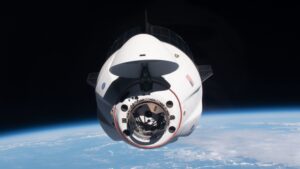NASA increases prices for ISS private astronaut missions
By Jeff Foust

WASHINGTON — NASA has increased the prices it will charge for future private astronaut missions to the International Space Station, saying the new prices reflect the true costs of supporting those missions.
A revised price list, posted April 29, updates the prices NASA charges to private missions flying to the ISS for cargo, station resources, crew time and other services. NASA said earlier this year it would update the pricing after revising its charges for commercial and marketing activities on the station.
Under the original pricing policy released in June 2019, as part of NASA’s low Earth orbit commercialization strategy, the agency charged $11,250 per person per day for life support and toilet capabilities, and $22,500 per person per day for other crew supplies, including food and air. There were additional, smaller changes for stowage, power and data.
The new pricing policy charges $5.2 million per person for ISS crew time to support a private astronaut mission, and $4.8 million per mission for integration and basic services, such as mission planning. The policy now charges between $88,000 and $164,000 per person per day for pre-staging food and other cargo on the station for those missions on NASA cargo vehicles and for disposing cargo on those spacecraft. It also charges between $40 and $1,500 per person per day for crew supplies and $2,000 per person per day for food.
The result of the new policy is a much higher price charged by NASA to companies conducting private astronaut missions. Under the old policy, the life support and crew supplies for a hypothetical four-person, one-week mission to the ISS would cost $945,000, a figure that doesn’t include stowage, data or power. Under the new policy, the cargo, food and supplies charges for the same mission would be more than $2.5 million at the low end of the quoted cost ranges, plus $10 million in per-mission fees.
The revised pricing, NASA said, “reflects full reimbursement for the value of NASA resources that are above the space station baseline capability.” However, the agency left open the door to negotiating those prices depending the specifics of the mission. “Due to the complexity of private astronaut missions and differing mission concepts, reimbursable values for these missions may vary,” the agency said, noting that detailed pricing “will be negotiated at time of mission award and contract or agreement finalization.”
The revised prices do not apply to the first private astronaut mission under the 2019 policy, the Ax-1 mission by Axiom Space. That Crew Dragon mission will fly three private customers and one Axiom professional astronaut to the station in early 2022. Both NASA and Axiom said that the agreement for that mission was signed under the original pricing policy, which remains in effect for that mission.
Axiom, which played down the earlier price increases for commercial ISS activities, is not concerned about the increased prices for private astronaut missions. “Axiom’s plans do not depend on the prices and services as they were listed,” company spokesman Beau Holder said.
NASA’s support for private astronaut missions also came up during the May 6 meeting of the Aerospace Safety Advisory Panel. Susan Helms, a former astronaut who serves on the panel, said that NASA has adapted “flight crew worthiness and certification practices along with previous experiences with space tourism” for dealing with those issues.
She added that NASA has recommended that private astronaut missions not include spacewalks. An agency study, she said, concluded that private astronaut spacewalks “not be generically offered due to the overall risks involved.” She added that no private missions currently being pursued through NASA planned to include spacewalks.
May 8, 2021 at 12:34AM
via SpaceNews read more...

Post a Comment